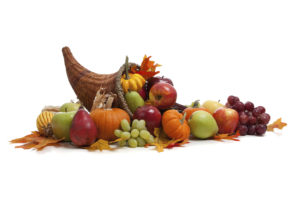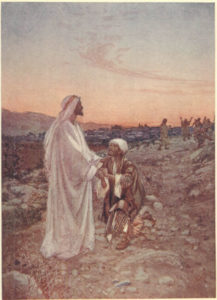 The Lord be with you
The Lord be with you
This coming Wednesday, November 21, is Thanksgiving Eve. While Thanksgiving is a national holiday, not a liturgical one, it is always appropriate for the Church to give thanks to the Lord our God for the many blessings he showers upon us. Therefore most of our sister congregations, in the USA, celebrate Thanksgiving along with the rest of our country. Other countries in the world also, often, have a “Thanksgiving” holiday, but not on the same date we celebrate it in our country.
As Thanksgiving is not a liturgical holiday, there are no appointed propers specific to the day. However there are appointed propers for “occasions.” This includes things like a congregation’s anniversary, mission observance, and so on. One of those occasions is a “Day of Thanksgiving.” These are the propers we will be using for our service this coming Wednesday. The lessons are: Deuteronomy 8:1-10; Psalm 67; 1 Timothy 2:1-4; and Luke 17:11-19. The homily is titled “Faith and Thanks.” Our opening hymn is “Praise to the Lord, the Almighty” (LSB 790). Our sermon hymn is “Now Thank We All Our God” (LSB 895). Our closing hymn is “God Bless Our Native Land” (LSB 965). Our worship will begin at 7:00 PM.
Below are the lessons with some initial thoughts.
Deuteronomy 8:1-10
1 “The whole commandment that I command you today you shall be careful to do, that you may live and multiply, and go in and possess the land that the Lord swore to give to your fathers. 2And you shall remember the whole way that the Lord your God has led you these forty years in the wilderness, that he might humble you, testing you to know what was in your heart, whether you would keep his commandments or not. 3And he humbled you and let you hunger and fed you with manna, which you did not know, nor did your fathers know, that he might make you know that man does not live by bread alone, but man lives by every word that comes from the mouth of the Lord. 4Your clothing did not wear out on you and your foot did not swell these forty years. 5Know then in your heart that, as a man disciplines his son, the Lord your God disciplines you. 6So you shall keep the commandments of the Lord your God by walking in his ways and by fearing him. 7For the Lord your God is bringing you into a good land, a land of brooks of water, of fountains and springs, flowing out in the valleys and hills, 8a land of wheat and barley, of vines and fig trees and pomegranates, a land of olive trees and honey, 9a land in which you will eat bread without scarcity, in which you will lack nothing, a land whose stones are iron, and out of whose hills you can dig copper. 10And you shall eat and be full, and you shall bless the Lord your God for the good land he has given you.
Initial Thoughts: The book of Deuteronomy is composed of five sermons given by Moses just before the Israelites enter the Promised Land. Chapter 34 is clearly not written by Moses but is intended to kind of wrap up the life and career of Moses. It is still the inspired Word of God, just like the rest of the Bible, only written down by someone other than Moses; Probably the same person who collected these sermons into a single volume. At any rate, in this lesson Moses is encouraging the people to remain faithful to the Lord in light of all he has already done for them and in light of the wonderful land to which the people had been led to by God. All these blessings should lead the people to “bless the Lord.” It is all too easy for us to discount God’s hand when considering all the good things that we have experienced in the USA. We should not forget the mercies of the Lord, as the Israelites did in later generations, but receive them with thankful hearts from his loving and generous hand.
Psalm 67 (antiphon v. 2)
God shall bless us;
let all the ends of the earth fear him!
May God be gracious to us and bless us
and make his face to shine upon us,
that your way may be known on earth,
your saving power among all nations.
Let the peoples praise you, O God;
let all the peoples praise you!
Let the nations be glad and sing for joy,
for you judge the peoples with equity
and guide the nations upon earth.
Let the peoples praise you, O God;
let all the peoples praise you!
The earth has yielded its increase;
God, our God, shall bless us.
God shall bless us;
let all the ends of the earth fear him!
Glory be to the Father and to the Son
And to the Holy Spirit;
As it was in the beginning,
Is now, and will be forever. Amen.
God shall bless us;
let all the ends of the earth fear him!
Initial thoughts: This Psalm again reminds us to be thankful to the Lord for all that he has done for us. The use of the word “bless” is interesting. God blesses us and we are to bless the Lord. However they are not the same thing. When God blesses us he gives to us many wonderful things, like the earth yielding its increase. The chief blessing from God is his “saving power,” which is to be known among all nations. This is, of course, the Great Commission in Old Testament language. When we bless the Lord we give him thanks and praise for his many mercies. When we “acknowledge him to be the Lord” (Te Deum) we are blessing the Lord. When the Holy Spirit grants us faith, God is blessing us.
1 Timothy 2:1–4
2:1 First of all, then, I urge that supplications, prayers, intercessions, and thanksgivings be made for all people, 2for kings and all who are in high positions, that we may lead a peaceful and quiet life, godly and dignified in every way. 3This is good, and it is pleasing in the sight of God our Savior, 4who desires all people to be saved and to come to the knowledge of the truth.
Initial thoughts: This well-known passage encourages us to keep all people in our prayers from the most humble to the most mighty. Such prayers are pleasing in God’s sight. Prayers that reach no higher than our own personal concerns are not the best example of Christian prayer. Naturally we do include our personal concerns, but there are many others in need of our prayers. That is why we, at Our Redeemer, encourage our members to keep all their neighbors in their prayers.
 Luke 17:11-19
Luke 17:11-19
11 On the way to Jerusalem he was passing along between Samaria and Galilee. 12And as he entered a village, he was met by ten lepers, who stood at a distance 13and lifted up their voices, saying, “Jesus, Master, have mercy on us.” 14When he saw them he said to them, “Go and show yourselves to the priests.” And as they went they were cleansed. 15Then one of them, when he saw that he was healed, turned back, praising God with a loud voice; 16and he fell on his face at Jesus’ feet, giving him thanks. Now he was a Samaritan. 17Then Jesus answered, “Were not ten cleansed? Where are the nine? 18Was no one found to return and give praise to God except this foreigner?” 19And he said to him, “Rise and go your way; your faith has made you well.”
Initial thoughts: This is the well-known story about how Jesus healed ten lepers while only one of them returned to thank him. What happened to the nine we are not told, other than they were delighted. We are always delighted when something good happens to us. Are we not joyful when the doctor tells us the operation was a complete success? Are we not happy when the boss calls us in and tells us we are getting a raise? Are we not overcome with joy when our children bring home an outstanding report card? The leper who returned was just as joyful, but he remembered who granted him this great boon, Jesus. Clearly, though, simply being delighted about wonderful blessings does not automatically lead to thanking the Lord who granted it. So we will be considering the relationship between thanksgiving and faith.
It is my hope that this little preview will help some to prepare for our Wednesday Thanksgiving Eve service.
Blessings in Christ
Pastor
